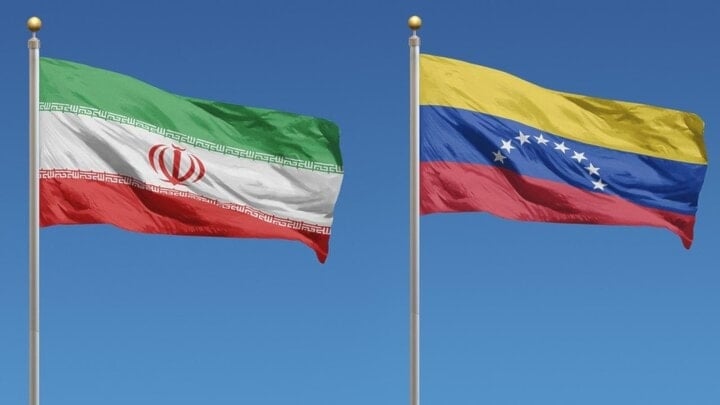Pezeshkian, Maduro reinforce Iran-Venezuela strategic ties
The Iranian and Venezuelan presidents discuss regional peace initiatives and expanding cooperation across multiple sectors following recent West Asia developments.
-

Iranian and Venezuelan flags (Mehr News Agency)
Iranian President Masoud Pezeshkian held a phone conversation with Venezuelan President Nicolas Maduro on Wednesday, underscoring Iran's support for independent nations following Iran's victory over "Israel" in June.
Pezeshkian expressed encouragement to justice-seeking nations and welcomed Maduro's initiative to organize a peace summit and propose a comprehensive West Asia plan. He praised Venezuela's principled stance in condemning Israeli aggression against Iran's national sovereignty, highlighting that such solidarity plays a vital role in uniting independent states under shared values of justice and resistance.
The Iranian president reiterated his country's commitment to diplomacy, while accusing the United States of enabling Israeli aggression through irresponsible conduct and diplomatic violations. He described these actions as clear breaches of international law and warned that the Islamic Republic would continue to respond decisively to any further provocations.
Maduro hails Iranian people's resilience
On his part, Venezuelan President Maduro extended condolences to the families of Iranian martyrs and strongly condemned the Israeli attacks. He noted that the Iranian people's resilience during the 12-day resistance created a significant historical moment, inspiring other independent nations striving for sovereignty and justice.
Maduro reaffirmed Venezuela's commitment to multilateral dialogue and expressed confidence in diplomacy as a means to achieve lasting peace and secure the legitimate rights of the Iranian people and other West Asian nations.
Historical foundations of the Iran-Venezuela alliance
Iran-Venezuela relations began in 1950 but significantly strengthened during the leadership of Hugo Chávez (1999–2013) and Mahmoud Ahmadinejad (2005–2013). The partnership was built on a shared opposition to US influence and institutionalized through a 20-year cooperation agreement signed in June 2022 during Maduro's visit to Tehran.
The agreement spans sectors, such as oil, petrochemicals, defense, agriculture, tourism, culture, and technology transfer.
Contemporary cooperation, economic integration
The Iran-Venezuela alliance, framed as a strategic partnership, is rooted in mutual resistance to Western sanctions and aligned ideological positions. This partnership is one of the most prominent examples of how sanctioned nations collaborate to maintain sovereignty and economic functionality.
Recent developments include the implementation of a free trade agreement that eliminates tariffs, movement toward dollar-free trade using national currencies and the BRICS Pay system, and technological cooperation. More so, Iran sent experts to Venezuela in 2024 to help with medical accelerators, used in radiation treatments for cancer patients, which ceased operations due to Western sanctions.
Additional collaboration includes joint oil refinery initiatives aimed at reviving Venezuela’s energy infrastructure, bilateral training programs for agricultural innovation, and expanded defense coordination. Iran has also supported Venezuela’s industrial recovery by supplying critical parts for manufacturing and maintenance sectors.

 3 Min Read
3 Min Read










